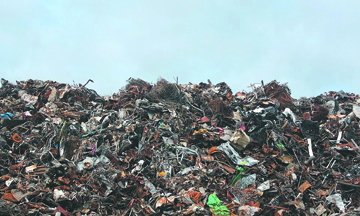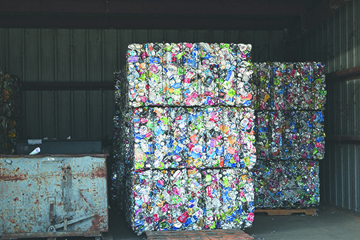by Luke Schmaltz
“We cannot solve our problems with the same thinking we used when we created them.”
— Albert Einstein
The importance of recycling seems, to some degree, to have taken a back seat to the divisive nature of the global warming argument. Yet, regardless of how you choose to process scientific evidence about carbon emissions and the rising temperature of the planet, the fact remains that civilization is producing massive amounts of trash. Further, some (not all) of the elements which end up in the landfill do so unnecessarily, and can better serve the greater economic good by being redirected back into the consumer commodities market.

Understand The Economics
Recycling is a bipartisan-friendly notion. From a purely fiscal standpoint, there are significant, trackable levels of energy savings that occur with specific types of materials such as aluminum and paper. The Reynolds Metal Company reports that making aluminum cans from their recycled counterparts takes 95 percent less energy than manufacturing them from raw aluminum bauxite. Meanwhile, the American Forest and Paper Association reports that recycling one ton of paper saves 7,000 gallons of water and enough energy to power the everyday household for six months.
Consider The Environmental Angle
From an anti-pollution approach, according to denvergov.org, the average family can lower greenhouse gas emissions by 340 pounds of carbon equivalent per year by simply recycling all of its mixed plastic waste. Also, the Glass Packaging Institute offers further eco-friendly evidence by reporting that glass recycling can reduce water pollution by 20% and air pollution by 50%. These stats are backed by the National Recycling Coalition, which reports that eight to 10 major types of water and air pollutants can be reduced through recycling. Plus, less garbage means less land that must be allocated for landfills.
Choose Your Facts And Act
The key to reducing the financial and environmental burden of unnecessary waste lies in the average citizen adopting a mindset of cyclic thinking in exchange for cause-and-effect behavior. This means integrating recycling into your long-term habits and routines rather than practicing it as an afterthought once the trash has already been produced. Whether you are driven by economic practicality or eco-friendly concern, here are seven ways you can do your part to expand the effort to reduce waste that is unnecessarily dumped into the ground.
Buy Recycled
Purchasing products that are made from or packaged in recycled materials helps increase the demand within this segment of the consumer product market. These can be paper goods, building materials made from recycled plastic and steel, refilled printer cartridges, activewear, smartphone covers and tote bags — just to name a few.
BYOB (Bring Your Own Bags)
Speaking of bags, you can greatly reduce paper and plastic waste by supplying your own means of getting your groceries home. The Recycling pages on denvergov.org repeatedly state that plastic bags cannot be recycled because they jam up the materials sorting machinery. That’s right — all plastic bags, even though you can reuse them once or twice around the house — eventually end up in the landfill. If everyone stopped relying on them, demand for landfill space could be systematically reduced.
Decontaminate Containers
Food containers that are placed in the recycle bin without first being rinsed out introduce contaminants into the process as the organic material begins to decompose. You can reduce the amount of items which end up in the landfill because they are full of food residue by giving items such as yogurt cartons, jelly jars, tin cans and juice bottles a sufficient rinse before recycling. This scenario includes the ever-present and confounding pizza box. While the box bottom, if covered in grease and residue, cannot be recycled — it can be composted by cutting it into small pieces and placing it in your backyard facility. Meanwhile, the box lid, as long as it is grease-free, can always be recycled.
Purchase Less Packaging
Your shopping protocol can involve a “buy less packaging” approach by making a plan ahead of time to curtail old habits in the produce section. Specifically, by choosing to not place fruits and vegetables which you plan to wash anyway into plastic bags as you pick them off the shelf. You can also choose products in compostable packaging (as indicated on the label) and you can buy items you consume regularly in bulk.
Donate Don’t Discard
Unwanted goods such as furniture, household items, cooking utensils and clothing do not have to be thrown away — especially if they are still functional or can be easily repaired. By taking them to your local thrift store, they can be reappropriated by someone who needs them instead of winding up in the landfill while still having value.
Maximize Organic Matter
According to the EPA, 30% of everything people throw away is comprised of food and yard waste. Grasscycling and composting are excellent ways of reducing the amount of plastic bags and fuel needed to haul away grass clippings and uneaten scraps. In turn, you are helping to save landfill space by placing organic matter in your own backyard — which enriches the soil, reduces the need for synthetic fertilizers and lowers your carbon footprint by decreasing methane emission from the landfill.
Go Out Of Your Way

If you’re already a proactive Denver recycler, you may have more items than can fit in your purple recycle bin. If this is the case, you can access the Cherry Creek Recycling Drop-off facility for overflow items that do not belong in the landfill as well as compostable materials such as food scraps and yard clippings. This is a service for Denver residents only, not for commercial entities.
In the realm of environmental issues, there are some areas where opinions are not unanimous. When it comes to recycling, however, any way you look at it (especially not facing downward into the landfill) makes practical, economic, eco-friendly sense.
